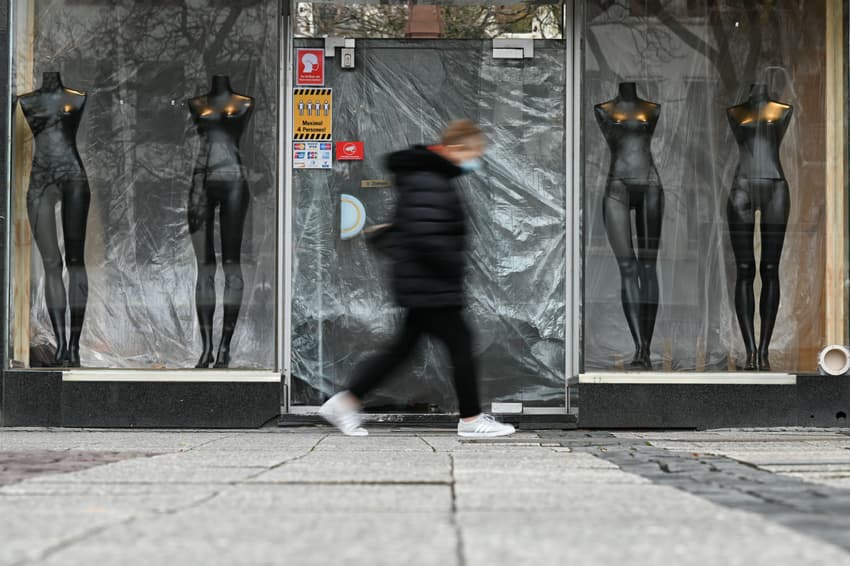Germany records small dip in unemployment at end of year

German unemployment held steady in
December, official data showed Tuesday, as government measures that closed
most shops over the Christmas period caused a jump in those on short-time
work (Kurzarbeit).
The seasonally adjusted jobless rate in Europe's top economy stood at 6.1 percent in December after three months of falls, according to the BA federal labour agency.
The figure marks a slight dip from November: Unemployment fell by 37,000 people, seasonally adjusted, to 2.7 million, although the figure is still nearly half a million higher than in December 2019.
Germany tightened virus restrictions last month, closing non-essential shops after already shuttering culture and leisure facilities in November.
READ ALSO: How to apply for 'Kurzarbeit' in Germany when your working hours are reduced
The shutdowns prompted employers to rely more heavily on a government-subsidised scheme that allows them to reduce workers' hours to avoid layoffs.
BA data showed another 660,000 people were placed on short-time employment between December 1st and 28th.
Most observers expect the curbs to continue until the end of January as infection rates remain stubbornly high in the country.
Germany on Tuesday reported 11,897 new coronavirus cases and 944 deaths, ahead of a meeting between Chancellor Angela Merkel and regional leaders to decide on extending the shutdowns.
READ ALSO: How long will Germany's tough lockdown measures be in place?
"The rising number of short-time workers, as well as the longer-term impact from the ongoing second lockdown and a high risk of insolvencies in 2021, clearly argue against too much optimism," said ING bank analyst Carsten Brzeski.
BA chairman Detlef Scheele said the pandemic was having a "very visible" impact on Germany's labour market.
"The stabilising effect of short-time work has, however, secured employment and prevented higher unemployment," he added.
Before the coronavirus, Germany's unemployment rate had hovered at a record low of around five percent.
Comments
See Also
The seasonally adjusted jobless rate in Europe's top economy stood at 6.1 percent in December after three months of falls, according to the BA federal labour agency.
The figure marks a slight dip from November: Unemployment fell by 37,000 people, seasonally adjusted, to 2.7 million, although the figure is still nearly half a million higher than in December 2019.
Germany tightened virus restrictions last month, closing non-essential shops after already shuttering culture and leisure facilities in November.
READ ALSO: How to apply for 'Kurzarbeit' in Germany when your working hours are reduced
The shutdowns prompted employers to rely more heavily on a government-subsidised scheme that allows them to reduce workers' hours to avoid layoffs.
BA data showed another 660,000 people were placed on short-time employment between December 1st and 28th.
Most observers expect the curbs to continue until the end of January as infection rates remain stubbornly high in the country.
Germany on Tuesday reported 11,897 new coronavirus cases and 944 deaths, ahead of a meeting between Chancellor Angela Merkel and regional leaders to decide on extending the shutdowns.
READ ALSO: How long will Germany's tough lockdown measures be in place?
"The rising number of short-time workers, as well as the longer-term impact from the ongoing second lockdown and a high risk of insolvencies in 2021, clearly argue against too much optimism," said ING bank analyst Carsten Brzeski.
BA chairman Detlef Scheele said the pandemic was having a "very visible" impact on Germany's labour market.
"The stabilising effect of short-time work has, however, secured employment and prevented higher unemployment," he added.
Before the coronavirus, Germany's unemployment rate had hovered at a record low of around five percent.
Join the conversation in our comments section below. Share your own views and experience and if you have a question or suggestion for our journalists then email us at [email protected].
Please keep comments civil, constructive and on topic – and make sure to read our terms of use before getting involved.
Please log in here to leave a comment.